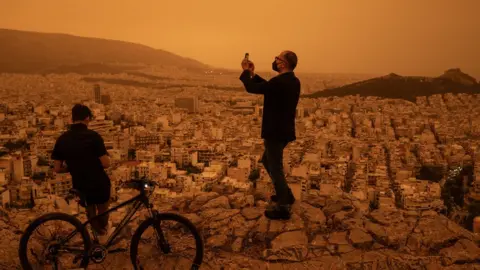
A dramatic orange haze has descended over Athens as clouds of dust have blown in from the Sahara desert.
It is one of the worst such episodes to hit Greece since 2018, according to officials.
Greece had already been struck by similar clouds in late March and early April, which also covered areas of Switzerland and southern France.
The skies are predicted to clear on Wednesday, says Greece's weather service.
Air quality has deteriorated in many areas of the country and on Wednesday morning the Acropolis in Athens was no longer visible because of the dust. The cloud has reached as far north as Thessaloniki.
Greeks with respiratory conditions have been urged to limit the time they spend outdoors, wear protective masks and avoid taking physical exercise until the dust clouds clear.

Greek skies were expected to clear on Wednesday
Image: EPA
The Sahara releases 60 to 200 million tonnes of mineral dust per year.
Most of the dust quickly descends to Earth, but some of the small particles can travel huge distances, sometimes reaching Europe.
The atmosphere especially in southern Greece has become stifling because of the combination of dust and high temperatures.
Meteorologist Kostas Lagouvardos compared the view from one weather station to the planet Mars.
The fire service on Tuesday reported 25 wildfires in the past 24 hours. One fire broke out near a naval base on the island of Crete - where temperatures soared above 30C (86F) - and homes and a kindergarten had to be evacuated, according to local reports.

Dust plumes from the Sahara are not uncommon across Europe and can vary in intensity, however, they tend to occur most often during the spring and autumn.
This current event across the Eastern Mediterranean was caused by an area of low pressure over Libya that brought strong southerly winds, drawing in high concentrations of dust and sand from North Africa into Greece, particularly on Tuesday. The southerly winds also brought hot desert air with them. Temperatures rose to well above the average for late April across the Greek mainland and islands, with 36.6C recorded in the Chania region of Crete.
The highest concentrations of dust will be focussed further east on Wednesday as a cold front with cleaner, fresher air continues to sweep in from the west. By the end of the week fresher, cleaner air will return to the Eastern Mediterranean with temperatures also back closer to normal for the time of year.
Additional reporting by Stav Danaos